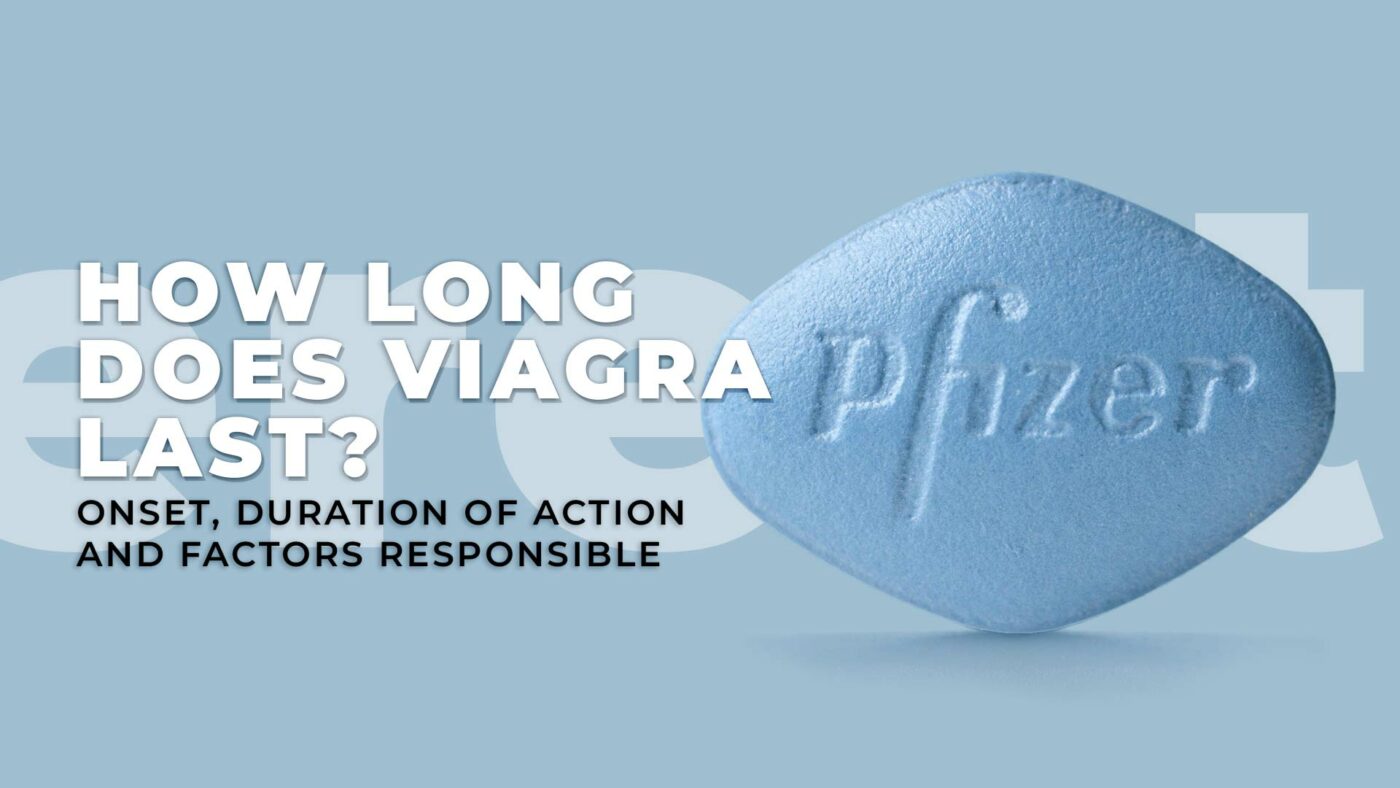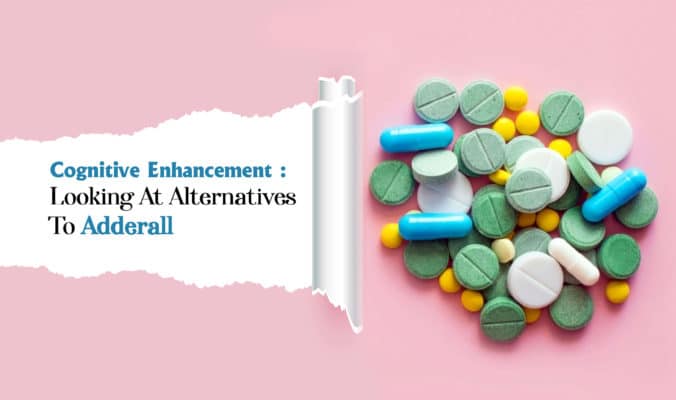How long does Viagra last: Onset, Duration of Action and Factors Responsible

Ever since Viagra came into the market, it has been a boon to men suffering from Erectile Dysfunction (ED). The little blue pill got its approval from the FDA in 1998. Until now, millions of prescriptions for Viagra have been given by doctors, and the numbers keep rising every day. The problem of Erectile Dysfunction makes a man unable to achieve or sustain an erection. To help with this, Viagra comes to the rescue. It increases the blood flow to the penis by relaxing the smooth muscles present in the walls of the blood vessels. For a person who’s just starting to take Viagra, there are questions that he might need answers to.
Table of Contents
How does Viagra work?
Before we discuss how Viagra works, you need to know how exactly an erection occurs.
The penis contains sponge-like structures called corpora cavernosa that the penis uses to become erect. When the penis is not erect, the arteries responsible for the transportation of blood into the corpora cavernosa are constricted. Thus, pressure cannot be built inside the penis, and the penis stays limp.
When you’re aroused, the arteries leading to the penis open up so that blood can reach the penis easily. This blood gets trapped in the corpora cavernosa allowing the penis to elongate and become erect.
However, when the arteries do not open up properly, and constriction occurs, it becomes difficult for a man to become erect. This occurs when the person is suffering from Erectile Dysfunction (ED).
Due to improper blood flow to the penis, a person finds difficulty in attaining or maintaining an erection. This happens due to the action of an enzyme known as Phosphodiesterase Type 5 (PDE 5) that blocks the flow of blood and does not let erection occur. When you’re aroused or sexually stimulated, a chemical known as Nitric Oxide is released into the penis. Nitric Oxide acts as a signaling molecule that stimulated an enzyme called guanylate cyclase. This chemical converts a chemical GTP into another chemical called cGMP. cGMP is produced as long as it keeps sending nerve signals. When the brain stops sending any signals, cGMP gets destroyed as the enzyme PDE 5 keeps deactivating it.
So, what Viagra does it – it blocks the action of enzyme PDE 5 and enables the production of cGMP (that controls the contraction and dilation of blood vessels). Viagra contains an active ingredient Sildenafil Citrate that allows cGMP to be produced properly. As cGMP is produced, blood flows easily to the penis. As more and more blood flows to the penis, pressure is created. This leads to an erection.
But that’s just about how Viagra results in an erection. Let’s now discuss how long does Viagra or Sildenafil last for and how long does it take for Viagra to work properly.
How long does Viagra last?
Viagra typically lasts for 4-5 hours. The effects of this medicine kick in anywhere between the first 30 minutes and 1 hour. It needs to be noted that taking Viagra alone won’t give you an erection. You need to be aroused or sexually stimulated for this pill to work properly.
The effects of Viagra seem to diminish after 4 hours. This indicates the half-life of Viagra i.e. 4 hours. The duration of action varies from one person to another. A study of 16 men suffering from ED with ages ranging from 36 to 68 showed that Viagra may be effective in some men even after 12 hours. This study involved an oral dose of Viagra 100 mg.
Another study that involved the use of Viagra 50 mg concluded that the average response time or the median time to erection was approximately 27 minutes. While doctors suggest that it’s best to take Viagra one hour before sexual intercourse, it might not take that long in some cases.
Let’s now take a look at the factors that affect how long Viagra will last.
Factors that Affect how long Viagra lasts for

There are multiple factors that affect how long Viagra lasts. These include:
- Age – For men aged 65 and above, it can take more time for Viagra to be dissolved into your bloodstream completely as their metabolism is slower. The body takes more time to get rid of the medication, which may not be the case in younger men. Thus, age and metabolism play a key role in deciding the onset of Viagra.
- Dosage – Viagra is available in various doses, such as Viagra 50 mg, Viagra 100 mg, Viagra 120 mg, Viagra 150 mg, and Viagra 200 mg. Higher doses tend to have a much more long-lasting effect as compared to lower doses. The recommended dosage i.e. Viagra 100 mg, takes approximately 30 minutes to kick in, and the effects usually last for 4-5 hours. However, a dose such as Viagra 200 mg may last for a longer duration of time.
- Diet – Viagra is intended to be taken on an empty stomach for it to work properly. A fatty meal can affect the onset of this medicine and delay the time it takes for the effects to kick in.
- Alcohol – Alcohol is known to deteriorate your health and cause side effects such as dizziness, headaches, and tachycardia. When you drink alcohol, the nerves that control the erection tend to have a slower response. This makes it difficult for the penis to maintain an erection.
- Existing Health Condition – If you’re suffering from kidney or liver problems, it can take longer for Viagra to be broken down completely and flushed out of your system completely.
- Medications – Certain medications can interact with Viagra and affect the way it works. Make sure you discuss all potential drug interactions with your doctor before making use of this medicine on your own.
Can I do anything to make Viagra last longer?
As discussed above, there are several factors that can affect the time Viagra lasts. If you’re 65 or above 65 years of age, Viagra will definitely last longer for you. A high dose such as Viagra 200mg will stay in your system for a longer period of time than a dose such as Viagra 50 mg. When taken on an empty stomach, the medicine dissolves into your bloodstream faster and starts to show its effects within the very first hour of its consumption. A low metabolic rate determines how slowly the drug gets broken down into your system. Therefore, if your metabolism is slow, the effects of the medication will last longer.
Shelf Life of Viagra
The effects of Viagra can be best experienced within the first year of its manufacture. The shelf life of Viagra is 2 years. It typically expires after 2 years and should not be used past its expiration date. It becomes less effective over time, and you should throw away your pills if they have expired.
Make sure that you store your pills properly in an airtight container and keep them away from direct heat, moisture, and sunlight.
How Often Should You Take It

Viagra is recommended to be taken once in 24 hours. You should not consume more than one tablet in 24 hours, or you may face serious side effects. Take this pill on an empty stomach and exactly 1 hour before sexual intercourse. Side effects that can occur include headaches, dizziness, nausea, palpitations, back pain, muscle pain, indigestion, diarrhea, etc. In some rare cases, conditions such as NAION and Priapism can occur. NAION causes sudden vision loss in one or both eyes. On the other hand, Priapism causes a prolonged erection of more than 4 hours. It occurs as a result of blood getting trapped in the penis. It is, therefore, recommended to follow your doctor’s prescription carefully and avoid consuming an overdose of the drug.
How long does it take to leave my system?
The effects of Viagra usually begin to wear off after 4 hours.
Side effects of Viagra
The commonly reported side effects of Viagra are
- headaches,
- facial flushing,
- indigestion or heartburn,
- back pain,
- stuffy nose, and
- nausea.
Priapism, which is a prolonged and painful erection lasting more than four hours, is a rare but serious side effect of Viagra that requires immediate medical attention. It is important to follow the recommended dose of Viagra and not take more if it doesn’t work within 30 minutes.
Although less common, there are other serious side effects associated with Viagra. These include
- sudden hearing loss,
- irregular heartbeat,
- severe low blood pressure, and
- blurred vision or vision loss in one or both eyes.
Risk Factors
If you have certain medical conditions, taking Viagra may pose a risk, and it is essential to consult with your healthcare provider beforehand. The following are some risk factors and warnings to consider:
Blood pressure issues: Viagra can cause low blood pressure by relaxing the muscles of your blood vessels to improve blood flow. If you already have low blood pressure, taking Viagra may worsen your condition. Similarly, if you have high blood pressure and use antihypertensive medications, taking Viagra can cause your blood pressure to drop further, especially if you are using an alpha-blocker antihypertensive like terazosin or tamsulosin, which is also used to treat prostate issues.
Heart problems: Individuals with a history of heart disease, heart failure, recent chest pains, or a heart attack should consult their healthcare provider before taking Viagra.
Vision concerns: Viagra may increase the risk of vision loss due to non-arteritic ischemic optic neuropathy (NAION), which is a small stroke of the optic nerve. People with a history of or risk factors for NAION should use caution when taking Viagra. Some individuals have also reported changes in color vision while taking Viagra.
Finally, if you have an allergy or hypersensitive reaction to Viagra, it is not recommended to use the medication.
Drug Interactions with Viagra
To avoid potential drug interactions, it’s important to inform your healthcare provider of any other prescription medications you are taking before starting Viagra or sildenafil. Some drugs, such as nitrates (e.g. nitroglycerin) used for chest pain, are contraindicated with Viagra as the combination can lead to life-threateningly low blood pressure. It is recommended to wait at least 24 hours after taking Viagra before taking nitrates.
Ritonavir, which affects the CYP3A4 enzyme in the liver responsible for breaking down sildenafil, can increase the concentration of Viagra in your blood and raise your risk of side effects like low blood pressure and prolonged erections if taken together.
Additionally, combining sildenafil with other PDE-5 inhibitors, such as Revatio for pulmonary arterial hypertension or other treatments for erectile dysfunction, should be avoided to prevent the potential risk of a drop in blood pressure.
Viagra vs. Other ED Medications
“I took Viagra, and it isn’t working. What should I do?”
If you don’t achieve any significant results from Viagra, there are some other alternatives that can help.
- Cialis – Cialis, also known as the Weekend Pill, contains an ingredient Tadalafil that works in a similar manner, and the effects last for 36 hours. It works well even on a full stomach. Therefore, Cialis can be taken with or without food. However, you should not consume more than one tablet in 24 hours.
- Levitra – Levitra contains the ingredient Vardenafil and lasts for a period of 5 hours. This medicine should be consumed on an empty stomach as a highly fatty meal can delay the effects of Levitra.
- Stendra – Stendra belongs to the same class of drugs i.e. PDE 5 inhibitors. It contains the ingredient Avanafil, and the effects last for up to 6 hours. It begins to work as soon as 15-30 minutes after the medicine is consumed.
Talk to your healthcare provider about other treatment options if you aren’t getting the results you want.
When to Seek Help

Underlying medical conditions can sometimes be the cause of erectile dysfunction, and treating those conditions may resolve the issue without the need for ED medications. In other cases, performance anxiety may be the root of the problem, and addressing the psychological and emotional aspects of sexual stimulation can help.
Your healthcare provider can assist you in understanding the various causes of erectile dysfunction and the potential benefits and risks associated with different treatment options.
If you are currently taking Viagra and feel that the medication is not effective, it is advisable to seek medical advice from your healthcare provider.
The Bottom Line
If you are struggling to achieve or maintain an erection, Viagra can be a useful option. For optimal results, take it on an empty stomach at least one hour before sexual activity and carefully follow the dosage instructions provided by your healthcare provider.
In the event that your erection lasts for more than four hours, seek immediate medical attention as this could lead to permanent damage.
References
- DailyMed. (2017). Viagra – sildenafil citrate tablet, film-coated. Retrieved on Aug. 14, 2022 from https://dailymed.nlm.nih.gov/dailymed/lookup.cfm?setid=a2a9f459-e692-4e85-83b0-a35fbf35e91b
- Eardley, I., Ellis, P., Boolell, M. and Wulff, M. (2002), Onset and duration of action of sildenafil for the treatment of erectile dysfunction. British Journal of Clinical Pharmacology, 53: 61S-65S. https://doi.org/10.1046/j.0306-5251.2001.00034.x
- Emanuele, M. A. & Emanuele, N. (n.d.). Alcohol and the male reproductive system. National Institute on Alcohol Abuse and Alcoholism. Retrieved on Aug. 14, 2022 from https://pubs.niaaa.nih.gov/publications/arh25-4/282-287.htm
- Smith, B. P. & Babos, M. (2022). Sildenafil. StatPearls. Retrieved on Aug. 14, 2022 from https://www.ncbi.nlm.nih.gov/books/NBK558978/
- Sooriyamoorthy, T. & Leslie, S. W. (2022). Erectile dysfunction. StatPearls. Retrieved on Aug. 14, 2022 from https://www.ncbi.nlm.nih.gov/books/NBK562253/
- Zucchi, A., Costantini, E., Scroppo, F. I., et al. (2019). The first-generation phosphodiesterase 5 inhibitors and their pharmacokinetic issue. Andrology, 7(6), 804–817. doi:10.1111/andr.12683. Retrieved from https://pubmed.ncbi.nlm.nih.gov/31350821/
- Muirhead, G.J., Wilner, K., Colburn, W., Haug-Pihale, G. and Rouviex, B. (2002), The effects of age and renal and hepatic impairment on the pharmacokinetics of sildenafil. British Journal of Clinical Pharmacology, 53: 21S-30S. https://doi.org/10.1046/j.0306-5251.2001.00029.x
Disclaimer
HisBlue is not a substitute for professional medical care or advice from your doctor. The health information on the HisBlue website is general and provided for your information only. We have ensured our content is accurate and current, with reviews by expert doctors. However, we cannot guarantee its accuracy or timeliness. This information is not meant to replace the diagnosis, treatment, or judgement of your doctor or another qualified healthcare provider.




